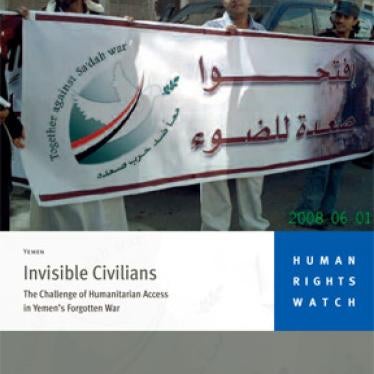(New York) - Yemeni officials and rebel leaders should ensure that their forces fully respect the laws of war in the ongoing armed conflict in northern Yemen, Human Rights Watch said today.
In separate letters to President Ali Abdullah Saleh and the Huthi rebel leader, Sayyid Abd al-Malik al-Huthi, Human Rights Watch urged them to ensure that their forces take all feasible steps to avoid harm to civilians. This includes never targeting civilians, not conducting attacks that cause indiscriminate or disproportionate loss of civilian life and property, and facilitating the delivery of humanitarian supplies to displaced persons and other civilians affected by the fighting.
"The latest fighting in northern Yemen has already displaced tens of thousands of civilians and exacerbated the humanitarian crisis there," said Joe Stork, deputy director of Human Rights Watch's Middle East division. "Government restrictions on aid agencies, the media and human rights groups are putting civilians at extra risk of unlawful attacks by both sides."
Yemen is party to the Geneva Conventions and other major international human rights and humanitarian law treaties, including the Optional Protocol on Children in Armed Conflict, which calls upon parties to end the use of children under age 18 in hostilities, and the Mine Ban Treaty.
In a fax sent June 22, 2009, prior to the most recent fighting, rebel leader al-Huthi had informed Human Rights Watch that his forces would fully respect the laws of war. This followed Human Rights Watch recommendations to the rebel group in a report published in November 2008. In today's letter, Human Rights Watch said that al-Huthi that his forces, like all non-state armed groups, are bound by the humanitarian law treaties to which Yemen is party, as well as the customary laws of war.
"The stated commitment by Huthi rebel forces to respect the laws of war is a welcome development that hopefully will spur better observance by both sides," Stork said. "The government should allow independent monitors to credibly verify compliance by both Huthi rebel and government forces."
Armed conflict between Huthi rebels, a Zaidi Shia revivalist movement, and government forces has erupted into sustained fighting on six occasions since 2004, primarily in the northernmost governorate of Sa`da. The most recent round of fighting began in late July and has intensified in recent weeks.
Human Rights Watch in July 2008 conducted research into humanitarian access to the war-affected civilian population and into politically motivated arrests and enforced disappearances of alleged Huthi sympathizers. Government restrictions prevented researchers from traveling to Sa'da and other areas of conflict to assess the compliance of government forces and Huthi forces with the laws of war. A government-imposed information blackout added to this difficulty. Researchers did, however, gather information on the fifth round of fighting (May 5 - July 17, 2008) that included allegations of serious laws of war violations by both sides, including the use of children under 18 in combat, use of anti-personnel landmines in civilian areas, and taking civilians hostage. In addition, Human Rights Watch heard allegations of aerial bombing and artillery shelling attacks on populated villages by government forces. Both sides also failed to facilitate humanitarian access to areas under their control.
There are no reliable estimates of those injured or killed in previous phases of the conflict, or in the current round of fighting. On August 28, the United Nations High Commissioner for Refugees (UNHCR), António Guterres, called for opening humanitarian corridors so civilians can leave the conflict zone and humanitarian workers can deliver aid. A UNHCR statement that day said the state of emergency had led to "an extreme shortage of food and other commodities as well as drastic price increases."
Following the halt in the fifth round of fighting in July 2008, the UN attempted to conduct missions to Sa'da governorate and other areas to assess civilian needs. An exploratory mission to Sa'da town took place in August 2008. A planned larger assessment, in which nongovernmental aid agencies would participate, has been under discussion since March 2009, but has yet to take place due to security concerns and government restrictions on travel to rural areas in the north.
Between March and July 2009, sporadic clashes in ‘Amran and western Sa'da provinces caused further civilian displacement to Sa'da town. The International Committee of the Red Cross, the sole international organization continuously operating there reported on July 30: "By end of June, more than 1,000 families had fled their insecure villages to take refuge either in one of the four camps ... or with relatives in the city. In the camps alone, the number of displaced people rose from 6,500 to more than 7,600." The UN estimated in late August the number of persons displaced by the war at between 125,000 and 150,000 persons.
"The Yemeni government should immediately allow free access to humanitarian organizations," Stork said. "International agencies are needed to provide urgent aid to a desperate civilian population."







